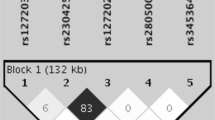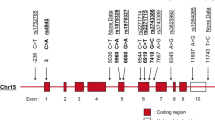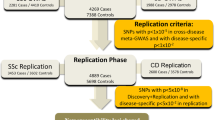Abstract
Alleles of interferon (IFN) regulatory factor 8 (IRF8) are associated with susceptibility to both systemic lupus erythematosus (SLE) and multiple sclerosis (MS). Although high-type I IFN is thought to be causal in SLE, type I IFN is used as a therapy in MS. We investigated whether IRF8 alleles were associated with type I IFN levels or serologic profiles in SLE and MS. Alleles that have been previously associated with SLE or MS were genotyped in SLE and MS patients. The MS-associated rs17445836G allele was associated with anti-double-stranded DNA (dsDNA) autoantibodies in SLE patients (meta-analysis odds ratio=1.92). The same allele was associated with decreased serum IFN activity in SLE patients with anti-dsDNA antibodies, and with decreased type I IFN-induced gene expression in peripheral blood mononuclear cell from anti-dsDNA-negative SLE patients. In secondary progressive MS patients, rs17445836G was associated with decreased serum type I IFN. Rs17445836G was associated with increased IRF8 expression in SLE patient B cells. In summary, IRF8 rs17445836G is associated with human autoimmune disease characterized by low-type I IFN levels, and this may have pharmacogenetic relevance as type I IFN is modulated in SLE and MS. The association with autoantibodies and increased IRF8 expression in B cells supports a role for rs17445836G in humoral tolerance.
This is a preview of subscription content, access via your institution
Access options
Subscribe to this journal
Receive 6 digital issues and online access to articles
$119.00 per year
only $19.83 per issue
Buy this article
- Purchase on Springer Link
- Instant access to full article PDF
Prices may be subject to local taxes which are calculated during checkout






Similar content being viewed by others
References
Harley JB, Kelly JA, Kaufman KM . Unraveling the genetics of systemic lupus erythematosus. Springer Semin Immunopathol 2006; 28: 119–130.
Kariuki SN, Niewold TB . Genetic regulation of serum cytokines in systemic lupus erythematosus. Transl Res 2010; 155: 109–117.
Niewold TB . Interferon alpha as a primary pathogenic factor in human lupus. J Interferon Cytokine Res 2011; 31: 887–892.
Graham RR, Kozyrev SV, Baechler EC, Reddy MV, Plenge RM, Bauer JW et al. A common haplotype of interferon regulatory factor 5 (IRF5) regulates splicing and expression and is associated with increased risk of systemic lupus erythematosus. Nat Genet 2006; 38: 550–555.
Harley JB, Alarcon-Riquelme ME, Criswell LA, Jacob CO, Kimberly RP, Moser KL et al. Genome-wide association scan in women with systemic lupus erythematosus identifies susceptibility variants in ITGAM, PXK, KIAA1542 and other loci. Nat Genet 2008; 40: 204–210.
Gateva V, Sandling JK, Hom G, Taylor KE, Chung SA, Sun X et al. A large-scale replication study identifies TNIP1, PRDM1, JAZF1, UHRF1BP1 and IL10 as risk loci for systemic lupus erythematosus. Nat Genet 2009; 41: 1228–1233.
Weckerle CE, Franek BS, Kelly JA, Kumabe M, Mikolaitis RA, Green SL et al. Network analysis of associations between serum interferon-alpha activity, autoantibodies, and clinical features in systemic lupus erythematosus. Arthritis Rheum 2011; 63: 1044–1053.
Niewold TB, Hua J, Lehman TJ, Harley JB, Crow MK . High serum IFN-alpha activity is a heritable risk factor for systemic lupus erythematosus. Genes Immun 2007; 8: 492–502.
Niewold TB, Adler JE, Glenn SB, Lehman TJ, Harley JB, Crow MK . Age- and sex-related patterns of serum interferon-alpha activity in lupus families. Arthritis Rheum 2008; 58: 2113–2119.
Niewold TB, Kelly JA, Flesch MH, Espinoza LR, Harley JB, Crow MK . Association of the IRF5 risk haplotype with high serum interferon-alpha activity in systemic lupus erythematosus patients. Arthritis Rheum 2008; 58: 2481–2487.
Niewold TB, Kelly JA, Kariuki SN, Franek BS, Kumar AA, Kaufman KM et al. IRF5 haplotypes demonstrate diverse serological associations which predict serum interferon alpha activity and explain the majority of the genetic association with systemic lupus erythematosus. Ann Rheum Dis 2012; 71: 463–468.
Salloum R, Franek BS, Kariuki SN, Rhee L, Mikolaitis RA, Jolly M et al. Genetic variation at the IRF7/PHRF1 locus is associated with autoantibody profile and serum interferon-alpha activity in lupus patients. Arthritis Rheum 2010; 62: 553–561.
Kariuki SN, Kirou KA, MacDermott EJ, Barillas-Arias L, Crow MK, Niewold TB . Cutting edge: autoimmune disease risk variant of STAT4 confers increased sensitivity to IFN-alpha in lupus patients in vivo. J Immunol 2009; 182: 34–38.
Robinson T, Kariuki SN, Franek BS, Kumabe M, Kumar AA, Badaracco M et al. Autoimmune disease risk variant of IFIH1 is associated with increased sensitivity to IFN-alpha and serologic autoimmunity in lupus patients. J Immunol 2011; 187: 1298–1303.
Agik S, Franek BS, Kumar AA, Kumabe M, Utset TO, Mikolaitis RA et al. The autoimmune disease risk allele of UBE2L3 in African American patients with systemic lupus erythematosus: a recessive effect upon subphenotypes. J Rheumatol 2012; 39: 73–78.
Kariuki SN, Franek BS, Kumar AA, Arrington J, Mikolaitis RA, Utset TO et al. Trait-stratified genome-wide association study identifies novel and diverse genetic associations with serologic and cytokine phenotypes in systemic lupus erythematosus. Arthritis Res Ther 2010; 12: R151.
Pothlichet J, Niewold TB, Vitour D, Solhonne B, Crow MK, Si-Tahar M . A loss-of-function variant of the antiviral molecule MAVS is associated with a subset of systemic lupus patients. EMBO Mol Med 2011; 3: 142–152.
Harley ITW, Niewold TB, Stormont RM, Kaufman KM, Glenn SB, Franek BS et al. The role of genetic variation near interferon-kappa in systemic lupus erythematosus. J Biomed Biotechnol 2010; 2010: 706825.
Kariuki SN, Franek BS, Mikolaitis RA, Utset TO, Jolly M, Skol AD et al. Promoter variant of PIK3C3 is associated with autoimmunity against Ro and Sm epitopes in African-American lupus patients. J Biomed Biotechnol 2010; 2010: 826434.
Jensen MA, Patterson KC, Kumar AA, Kumabe M, Franek BS, Niewold TB . Functional genetic polymorphisms in ILT3 are associated with decreased surface expression on dendritic cells and increased serum cytokines in lupus patients. Ann Rheum Dis 2013; 72: 596–601.
Koldobskaya Y, Ko K, Kumar AA, Agik S, Arrington J, Kariuki SN et al. Gene-expression-guided selection of candidate loci and molecular phenotype analyses enhance genetic discovery in systemic lupus erythematosus. Clin Dev Immunol 2012; 2012: 682018.
Salloum R, Niewold TB . Interferon regulatory factors in human lupus pathogenesis. Transl Res 2011; 157: 326–331.
Cherian TS, Kariuki SN, Franek BS, Buyon JP, Clancy RM, Niewold TB . Brief Report: IRF5 systemic lupus erythematosus risk haplotype is associated with asymptomatic serologic autoimmunity and progression to clinical autoimmunity in mothers of children with neonatal lupus. Arthritis Rheum 2012; 64: 3383–3387.
Lessard CJ, Adrianto I, Ice JA, Wiley GB, Kelly JA, Glenn SB et al. Identification of IRF8, TMEM39A, and IKZF3-ZPBP2 as susceptibility loci for systemic lupus erythematosus in a large-scale multiracial replication study. Am J Hum Genet 2012; 90: 648–660.
De Jager PL, Jia X, Wang J, de Bakker PI, Ottoboni L, Aggarwal NT et al. Meta-analysis of genome scans and replication identify CD6, IRF8 and TNFRSF1A as new multiple sclerosis susceptibility loci. Nat Genet 2009; 41: 776–782.
Gorlova O, Martin JE, Rueda B, Koeleman BP, Ying J, Teruel M et al. Identification of novel genetic markers associated with clinical phenotypes of systemic sclerosis through a genome-wide association strategy. PLoS Genet 2011; 7: e1002178.
Hambleton S, Salem S, Bustamante J, Bigley V, Boisson-Dupuis S, Azevedo J et al. IRF8 mutations and human dendritic-cell immunodeficiency. N Engl J Med 2011; 365: 127–138.
Niewold TB . Interferon alpha-induced lupus: proof of principle. J Clin Rheumatol 2008; 14: 131–132.
Niewold TB, Clark DN, Salloum R, Poole BD . Interferon alpha in systemic lupus erythematosus. J Biomed Biotechnol 2010; 2010: 948364.
Feng X, Reder NP, Yanamandala M, Hill A, Franek BS, Niewold TB et al. Type I interferon signature is high in lupus and neuromyelitis optica but low in multiple sclerosis. J Neurol Sci 2012; 313: 48–53.
Lovgren T, Eloranta ML, Bave U, Alm GV, Ronnblom L . Induction of interferon-alpha production in plasmacytoid dendritic cells by immune complexes containing nucleic acid released by necrotic or late apoptotic cells and lupus IgG. Arthritis Rheum 2004; 50: 1861–1872.
Weckerle CE, Niewold TB . The unexplained female predominance of systemic lupus erythematosus: clues from genetic and cytokine studies. Clin Rev Allergy Immunol 2011; 40: 42–49.
Feng X, Han D, Kilaru BK, Franek BS, Niewold TB, Reder AT . Inhibition of interferon-beta responses in multiple sclerosis immune cells associated with high-dose statins. Arch Neurol 2012; 69: 1303–1309.
Tan EM, Cohen AS, Fries JF, Masi AT, McShane DJ, Rothfield NF et al. The 1982 revised criteria for the classification of systemic lupus erythematosus. Arthritis Rheum 1982; 25: 1271–1277.
Hua J, Kirou K, Lee C, Crow MK . Functional assay of type I interferon in systemic lupus erythematosus plasma and association with anti-RNA binding protein autoantibodies. Arthritis Rheum 2006; 54: 1906–1916.
Niewold TB, Rivera TL, Buyon JP, Crow MK . Serum type I interferon activity is dependent on maternal diagnosis in anti-SSA/Ro-positive mothers of children with neonatal lupus. Arthritis Rheum 2008; 58: 541–546.
Niewold TB, Kariuki SN, Morgan GA, Shrestha S, Pachman LM . Gene-Gene-Sex interaction in cytokine gene polymorphisms revealed by serum interferon alpha phenotype in juvenile dermatomyositis. J Pediatr 2010; 157: 653–657.
Kirou KA, Lee C, George S, Louca K, Papagiannis IG, Peterson MG et al. Coordinate overexpression of interferon-alpha-induced genes in systemic lupus erythematosus. Arthritis Rheum 2004; 50: 3958–3967.
Parra EJ, Marcini A, Akey J, Martinson J, Batzer MA, Cooper R et al. Estimating African American admixture proportions by use of population-specific alleles. Am J Hum Genet 1998; 63: 1839–1851.
Acknowledgements
SN Kariuki—HHMI Gilliam Fellowship for Advanced Study; AT Reder—National MS Society RG#4509A/2; TB Niewold—Research grants from the NIH (R01 AR060861, K08 AI083790, P30 DK42086, Clinical Research Loan Repayment AI071651, CTSA Pilot Grant from UL1 RR024999), Lupus Research Institute Novel Research Grant and Alliance for Lupus Research Target Identification in Lupus Grant.
Author information
Authors and Affiliations
Corresponding author
Ethics declarations
Competing interests
The authors declare no conflict of interest.
Rights and permissions
About this article
Cite this article
Chrabot, B., Kariuki, S., Zervou, M. et al. Genetic variation near IRF8 is associated with serologic and cytokine profiles in systemic lupus erythematosus and multiple sclerosis. Genes Immun 14, 471–478 (2013). https://doi.org/10.1038/gene.2013.42
Received:
Revised:
Accepted:
Published:
Issue Date:
DOI: https://doi.org/10.1038/gene.2013.42
Keywords
This article is cited by
-
The contribution of thymic tolerance to central nervous system autoimmunity
Seminars in Immunopathology (2021)
-
Ankylosing spondylitis is associated with aberrant DNA methylation of IFN regulatory factor 8 gene promoter region
Clinical Rheumatology (2019)
-
The Post-GWAS Era: How to Validate the Contribution of Gene Variants in Lupus
Current Rheumatology Reports (2019)
-
Type I interferon in rheumatic diseases
Nature Reviews Rheumatology (2018)
-
Hypermethylation of Interferon Regulatory Factor 8 (IRF8) Confers Risk to Vogt-Koyanagi-Harada Disease
Scientific Reports (2017)



